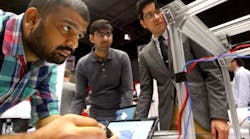All manufacturers at some point face challenges beyond their scope of knowledge and experience. This is especially true for your technological capabilities; you can’t possibly be expected to be current on everything that is coming next in your sector and specialties. But you may be surprised to learn that there are nearby entities with technical expertise that often have access to state-of-the-art equipment and free or low-cost labor looking for ways to help you and other local manufacturers. In fact, they may need industry partners in order to fulfill their mission.
We’re talking about working with universities, community colleges, trade schools, and other educational institutions. They often can provide access to free or low-cost resources to bring you a solution to a problem that is costing you money, stress or even impacting morale. Universities and other educational institutions need industry partners in order to graduate students and meet their goals. They need, and want, opportunities to help local manufacturers.
Research institutes often have bandwidth and are looking for projects from industry to give to the students, especially in engineering and other mechanical disciplines. For example, many universities offer capstone projects in which a team of 4-5 students, with professor oversight, work with a local company on a company-driven project.
University resources and industry specialists make for a powerful combination of creativity and knowledge. They can help manufacturers in a variety of ways, such as tinkering with technology solutions outside of the production and traditional research environments, connections with experts throughout the region, or being a niche service provider.
Your local MEP Center is part of larger networks that often are aware of specialty grants that universities have received and can connect you to these resources. Local resources available to manufacturers will vary by state, region and local MEP Centers. In our case, our local MEP Center is based in the University of Louisville, a top-tier research institution that has 20-plus centers of technological specialties, such as robotics, automation, 3D printing, renewable energy, cybersecurity, and AI.
Benefits of Working With Universities Extend Beyond Project Results
The primary benefit of working on a technology-driven partnership with an educational institution is that the partner helps deliver results with an immediate impact. The university often provides access to equipment and a specialist that you may not have found or perhaps could not afford. You will see results in your operation.
Another obvious benefit is that you get access to students and potential future employees. Many engagements with universities involve capstone projects in which students nearing graduation take on a major project as part of their final requirements. Those students will go on site to tour your facility to see the project problem in the real world. But they also see what else is going on at your operation and learn about your company, workplace and culture. Capstone projects can lead to direct hires and a pipeline of prospects.
Other benefits include that stakeholders at the university can tout your company’s involvement in many ways, such as:
● You are helping the university develop its prowess in using state of the art technology and specialty resources. You are plugging into this community of interest.
● You might become an attractive job prospect for graduates or a target company for students seeking internships or part-time positions.
Drivers for Engagement Often Involve Incorporating New Technology
Manufacturers usually engage with universities and their engineering prowess to help use new technology to solve problems and reduce pain points. Common areas for partnerships include working through product development issues, design changes for products and components, and incorporating new technology into an operation. The partnerships also help manufacturers address key workforce issues – where they can find the talent to operate these systems and provide technical support.
Here are three examples of areas in which universities are working with manufacturers.
3D Printing
Manufacturers worked with the University of Louisville through their Kentucky Manufacturing Extension Partnership (KY-MEP) to learn how to design and produce parts through Additive Manufacturing.
Digital Twinning
Ohio University worked with entities from the Ohio MEP to help small manufacturers adopt digital twinning technology. Digital twinning allows manufacturers to perform engineering validation of new technologies such as robotics, CNC machines and automated systems, prior to purchasing physical components or interrupting their current manufacturing processes.
Industry 4.0 In Metalworking
Northern Illinois University and Illinois Manufacturing Excellence Center (IMEC, the state’s MEP Center) worked with smaller manufacturers to bring more advanced manufacturing technology adoption and implementation into metalworking, the largest manufacturing sector in the state. They saw great potential in specific Industry 4.0 technologies but also building a future workforce to accelerate the competitiveness of the state’s automotive, aerospace and agricultural sectors.
Challenges Include Working on a University’s Timeline
Manufacturers that seek outside help are frequently looking for an immediate solution. But most engagements with universities are part of a structured semester project, meaning the work will be done on a university’s timeline, not yours. So not every project with a university will be a good fit. But if you have struggled finding the right longer-term, sustainable solution, it might be worth the added time it will take in order to get a fresh perspective, expertise and access to newer technology.
Communication also is key as engagements require kickoff meetings, weekly or bi-weekly updates, midterm meetings, and wrap up meetings. Sometimes a significant project is carried over from one semester to the next, which will involve a new set of students and new expectations, etc. There may be costs associated with a project, though costs often are negligible or may be part of a larger engagement, such as with your local MEP Center. But mostly this will cost you time.
Intellectual property (IP) can come into play when working with a university. Before you finalize an engagement, be sure to know the university’s rules and guidelines for IP, licensing and royalties.
Your Local MEP Center Can Connect You to a Educational Resources
Local MEP Centers can help you set up a partnership for success with a university or institute of higher learning through establishing roles, responsibilities and principles of the relationship early on. They can help you identify opportunities to address talent and workforce development issues and expand the partnership to leverage partner assets for greater impact. Contact your local MEP Center to get started.
About the Author
Scott Broughton
Executive Director, Kentucky Manufacturing Extension Partnership (KY-MEP)
Director of Manufacturing Engagement at the University of Louisville
Scott is an innovative leader with 30-plus years working as a growth professional in B2B and B2C industries. He is experienced in design, development, and delivery of innovative change management and business growth systems.
Sponsored by:




